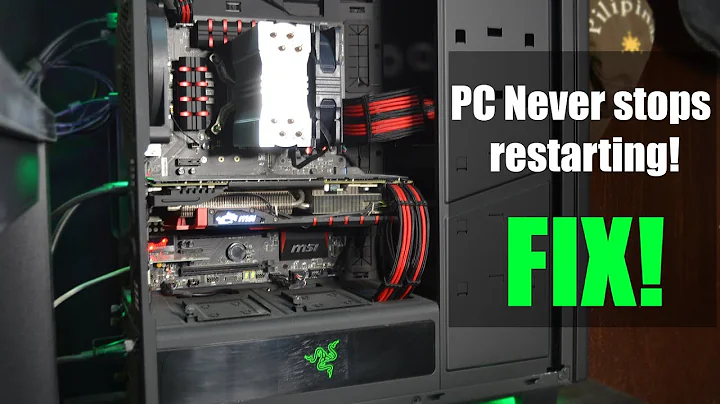Will restarting the computer a lot (about 10 times in 2 minutes) damage the motherboard?
Solution 1
Restarting your computer a lot shouldn't hurt anything. It could add wear-and-tear on components, but nothing significant. If you're completely powering off and on again, that'll wear things like your capacitors a bit faster, still nothing significant. The machine was meant to be turned off and on. And unless your machine was made from complete garbage, the added wear won't change it's performance until long after it's become your newest boat-anchor due to antiquity.
Now, if you're pulsing power off and on like 30 times a minute, that may have some implications. It'd really depend on the specific electrical characteristics of your power supply and motherboard.
This gives me an idea for a crazy hack-a-day project one could do - pulse a computer off and on at a fairly fast rate until it fails - just to see how long it takes..
Solution 2
It really shouldn't. The only thing that I could think of that could be harmful is that sometimes a reboot will cause a HDD to spin down and then power sent to the HDD. The constant powering down and powering up of the HDD is less than ideal. Also, CPU fans will sometime do a max spin up upon rebooting. Again, not horrible, but less than ideal.
I had a Windows XP computer that was stuck in a BSOD death loop with rebooting. It sat there for about 10 days constantly rebooting. I ended up formatting the drive and getting it running again. This was 4 years ago and it's still running strong.
That is not to say that you'll have bad luck one time and fry something...
Solution 3
Not really.
Leaning against the power cord on an older system connected to a faulty outlet can when it causes the power to flicker across the system several dozen times in a few seconds. That happening within the last week of the 1st semester of classes when I've got a boatload of English 1A papers to turn in is a quick way to learn about Data Recovery tools and OCR (scanning the old versions of the essays in to save retyping time).
But no, frequent reboots, as long as they are on purpose and not from bad power situations, will not generally cause problems.
Related videos on Youtube
user784637
Updated on September 18, 2022Comments
-
user784637 almost 2 years
I was just curious if there are consequences for doing this and what they would be for the mobo, or any other internal component.
-
kingchris over 12 yearsAre you pressing the rest button or cycling the power ?
-
user784637 over 12 yearsBoth. Is unplugging the power cord more detrimental than pushing the rest button on the front of the tower
-
kingchris over 12 yearsYes. Electronic equipment has capacitors that charge and discharge voltages naturally. Having worked in an electronic repair center in my youth I have seen capacitors explode from a faulty power switch that was stuttering the main power. This was causing voltage spikes on all the output rails. The exploding caps are rare but the voltage spikes could blow or damage electronic chips who don't like their 5 volt rail spiked to 12 volts etc.
-
-
Synetech over 12 yearsYes, the hard-drive is at risk if you keep turning it on and off. More specifically, if the power is cut on and off rapidly (eg a bad power-cord connection), it will not give the drive time to correctly park the heads, so it could damage the platter and create bad sectors or worse.
-
 James T Snell over 12 years@Psyco - I'm pretty sure killing a typical machine this way would take so many cycles at a frequency that doesn't threaten 99.999% of machines in the wild. Regardless, it'd be fun to watch a time-lapse video of whatever component(s) fail in this case.. Provided blue-smoke and fire/explosions are involved (probably not)
James T Snell over 12 years@Psyco - I'm pretty sure killing a typical machine this way would take so many cycles at a frequency that doesn't threaten 99.999% of machines in the wild. Regardless, it'd be fun to watch a time-lapse video of whatever component(s) fail in this case.. Provided blue-smoke and fire/explosions are involved (probably not)




